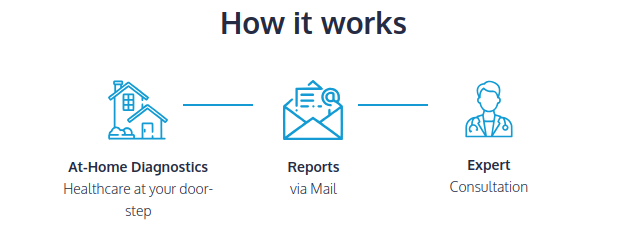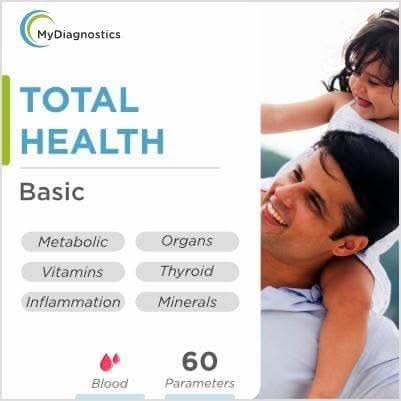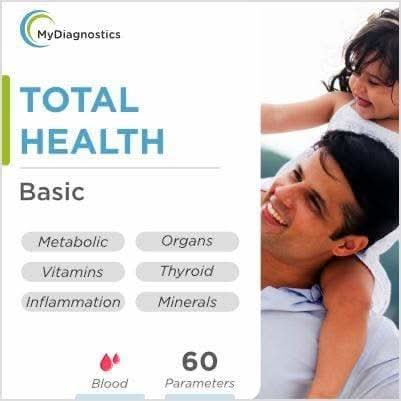Total Health - Vitals - Full Body Checkup in Chennai
Test Parameters


About the Total Health - Vital - Health Checkup in Chennai
The Total Health - Vitals full body checkup in Chennai is a complete assessment package designed to provide health information through testing of vital parameters. By testing your blood sample for 60 parameters, the full body checkup package empowers you with the right information on your overall health.
You can leverage the test for annual assessments as well as to determine the causes of chronic symptoms. If you are experiencing lethargy, low vitality, weakness, chronic pain, and other critical symptoms, you can get a full body test in Chennai through this checkup package. With the convenience of at-home testing and the reliability of NABL certified laboratory testing, you can be assured of quick and accurate results across all 60 parameters.
Let us further understand the role of critical parameters that need to be tested and how they impact our body.
Energy & Metabolism

It can be broadly classified into two processes: catabolism and anabolism. Catabolism involves the breakdown of complex molecules into simpler forms, resulting in the free release of energy.
Anabolism, on the other hand, involves the synthesis of complex molecules from simpler forms, but at the cost of energy.
Both processes run simultaneously in cells and are tightly regulated to maintain an appropriate balance conducive to cellular well-being and energy availability.
Catabolic Processes
The three major catabolic pathways are glycolysis, the citric acid cycle (also known as the Krebs cycle), and oxidative phosphorylation.
Glycolysis occurs in the cytoplasm and degrades glucose into two molecules of pyruvate, generating a small amount of ATP.
In aerobes, pyruvate is transported into the mitochondria, then enters the citric acid cycle.
In this cycle, high-energy electrons are absorbed and carried to the electron transport chain where a tremendous amount of ATP is synthesized in a process called oxidative phosphorylation.
Though fermentation may occur with or without oxygen, these organisms may still make an amount of ATP much lesser than oxidative phosphorylation.
Anabolic Processes
Anabolic reactions, or biosynthetic reactions, are energy-requiring processes for the construction of complex molecules that provide the structural framework and function of cells.
The critical anabolic pathway is protein synthesis, in which cells construct proteins from amino acids.
These proteins serve as enzymes, structural components, and signaling molecules essential to cellular function.
Another anabolic process is the synthesis of fatty acids and lipids, which form cell membranes and store energy for later use.
Regulation of Metabolism
Metabolism is tightly regulated by several factors including hormones, enzyme activity, and feedback mechanisms.
There are hormones such as insulin and glucagon that regulate glucose metabolism.
Insulin is the hormone that lowers the concentration of blood glucose because it increases the uptake of glucose and storage.
On the other hand, glucagon raises the concentration of blood glucose through the stimulation of release of glucose from stored glycogen.
Enzymes serve a central role in metabolic pathways as catalysts, thereby speeding up chemical reactions.
These enzymes are often regulated through allosteric mechanisms, whereby the molecules bind to the enzyme and change its activity.
This allows cells to adjust their energy demands and conditions in response to different stimuli.
Energy and Health
Health is the result of efficient energy production and regulation of metabolism. Derangements in metabolic pathways can lead to diseases like diabetes, obesity, and metabolic syndrome.
The understanding of metabolism helps not only in the treatment of these diseases but also opens pathways for optimisation of nutrition, exercise, and overall wellness.
Sex Hormones
Sex hormones are critical regulators in the development of reproductive and sexual characteristics. They play central roles in physical and behavioral traits. Estrogens, progesterone, and androgens are the key sex hormones. Estrogen and progesterone have been termed female sex hormones, mainly produced in the ovaries, while androgen, such as testosterone, is associated with male and is mainly produced in the testes. However, both men and women do produce all these hormones; they just produce them at different levels.
In women, estrogens will regulate the menstrual cycle and influence the secondary sexual characters such as breast development to prepare the body for a possible pregnancy. Progesterone also supports the menstrual cycle by maintaining pregnancy, but influences mood. Testosterone is in charge of producing sperms, muscle growth in males, and the production of secondary sexual characters which characterize men, such as facial hair and a deeper voice.
Besides reproductive functions, sex hormones regulate mood and energy levels, bone density, and general health. The imbalance of these hormones results in various health disorders from polycystic ovary syndrome in women to hypogonadism in men. Knowledge of such hormones and their functions creates a basis not only in the reproductive health but in the management of broader dimensions of health and well-being among both sexes.
Essential Vitamins
Vitamins are organic compounds that the human body needs in small quantities for growth, metabolism, immunity, and cell functioning. They play a vital role in almost every bodily function, from energy production to maintaining healthy skin and vision. Most of the vitamins cannot be produced by the body, but they are available through a balanced diet or supplements. Each vitamin has unique functions, and deficiencies can lead to some serious health problems. The essential vitamins are often divided into two broad categories: fat-soluble and water-soluble vitamins.
Fat-Soluble Vitamins
Fat-soluble vitamins include vitamins A, D, E, and K. These dissolve in fat and are stored in fatty tissues and liver tissues of the body. Since they are stored, it is not necessary to consume them frequently, like water-soluble vitamins. However, excessive intake can result in toxicity.
1. Vitamin A :
Vitamin A serves a key function in the eyes and skin, among other tissues, for the maintenance of vision, reproduction, cell communication, and immune functions. The most common foods containing beta-carotene are carrots and sweet potatoes and leafy greens that get metabolized to vitamin A in the human body. Night blindness results from the deficiency of vitamin A.
2. Vitamin D :
It is known as the "sunshine vitamin." The body's ability to absorb calcium it needs depends on the presence of vitamin D, which is very important for bone health. It aids in supporting immune function and reducing inflammation. Although the skin does synthesize vitamin D from exposure to sunlight, food, such as fatty fish, milk that's been fortified, and eggs, also contain this vitamin. A deficiency in vitamin D causes rickets in children and osteoporosis in adults.
3. Vitamin E:
An antioxidant, vitamin E shields cells from free radical attacks, boosts immune functions, and is essential for a healthy skin and eyesight. It is found in nuts, seeds, and leafy green vegetables. Although rare, deficiency in vitamin E causes nerve and muscular damage.
4. Vitamin K :
Vitamin K is fundamental to blood clotting in addition to bone health. It allows the body to synthesize proteins that are paramount in the coagulation process. It can be found in green leafy vegetables, fish, meat, and eggs. There is bleeding disorder and lesser bone density if there lacks vitamin K.
Water Soluble Vitamins
These dissolve in water and are not stored in the body, meaning they need to be taken more frequently. The B-complex vitamins and vitamin C fall under this category.
1. Vitamin C :
Vitamin C, also known as ascorbic acid, is the strongest antioxidant that protects the body by protecting the skin from damage while enhancing the efficiency of immune function and absorbing iron from the diet. Vitamin C is found in citrus fruits, berries, and bell peppers. Its deficiency leads to scurvy, characterized by fatigue, gum diseases, and several skin-related problems.
2. B-Complex Vitamins:
A group that helps the body in metabolism, energy, and red blood cell production. All of the B's have their specific jobs in the body:
• B1 (Thiamine): An essential nutrient in energy metabolism and in general conduction function of nerves; found on whole grains, nuts and seeds; its deficiency leads to beriberi which is a disease affecting the heart and nerves.
• B2 (Riboflavin): It boosts energy, healthy skin and vision. It is found in eggs, green leafy vegetables, and dairy. Riboflavin deficiency causes sore throat, skin problems, and eye issues.
• B3 (Niacin): Important to repair DNA and maintenance of the skin. Niacin is found in meat, fish, and whole grains. Pellagra, which can be caused by a lack of it, is characterized by dermatitis, diarrhea, and dementia.
• B5 (Pantothenic Acid): It supports energy production through the process of breaking down fats and carbohydrates and synthesis of coenzyme A. Meat, dairy, and legumes are good sources of it. Incomplete absence is rarely found.
• B6 (Pyridoxine): Supports the activity of the brain, formation of red blood cells, and the immune system. The primary sources are fish, poultry, and potatoes. Its deficiency may lead to anemia, skin irritation, and mood swings.
• B7 (Biotin): Biotin promotes the metabolism of carbohydrates, fats, and proteins, as well as hair, skin, and nail health. The eggs, nuts, and seeds contain biotin, and its deficiency leads to rashes in the skin and hair loss.
• B9 (Folate): During pregnancy, folate is significant for DNA synthesis and cell division. Folates are very richly found in leafy greens, legumes, and fortified grains. Folate deficiency causes some birth defects and anemia.
• B12 (Cobalamin): This vitamin is very important for the proper functioning of nerves and the production of red blood cells. It is found in meats, dairy products, and eggs. Lack of B12 causes pernicious anemia and problems associated with the nervous system.
Importance and Deficiencies
Essential vitamins allow the body to function and prevent deficiencies in diseases. If these deficiency conditions are not treated properly, they may provoke chronic problems, from anemia through B12, folate, to osteoporosis through D and immunologic deficiencies through A, C, and D. Vitamins must be taken from diet at adequate levels.
Supplementation and Balance
Though many will get enough through a well-balanced diet, there are others who would require supplementation. Those following specific diets, individuals with certain medical conditions, and pregnant women fall in this category. There is also the danger of over-supplementation, particularly for fat-soluble vitamins, which can cause toxicity. It is always best to consult a healthcare provider for the best possible vitamin intake.
Essential Minerals
They are inorganic elements the body requires to carry out basic functions. The quantities that the body requires them may vary. These range from building robust bones to regulation of the heart rhythm. Minerals fall into two primary categories, which are trace minerals and macrominerals. Trace minerals are taken in relatively small amounts; however, macro- minerals are used in higher concentrations, though both play crucial roles in the general body health.
Macro- minerals
1. Calcium:
This is the most abundant mineral in the body. Calcium is used for the strength of bones and teeth, contraction of muscles, blood clotting, and transmission of nerve impulses. Approximately 99% of the body's calcium is found in bones and teeth. Sources of calcium are milk products, leafy vegetables, and fortified foods. Deficiency of calcium causes osteoporosis and weak bones. It is common among older adults.
2. Phosphorus:
Phosphorus has a combination with calcium where it forms and maintains bones and teeth, produces energy, and is part of DNA and RNA. Good sources for phosphorus are foods high in protein such as meats, poultry, dairy, and legumes. Deficiency is rare but causes muscle weakness and bone pains.
3. Magnesium:
It is essential for muscular and nerve function, energizing the body and controlling heart rhythm. Additionally, magnesium is involved in thousands of enzymatic reactions. Rich sources of magnesium are found in nuts, seeds, green leafy vegetables, and whole grains. Some deficiency symptoms include muscle cramps, fatigue, and cardiovascular problems.
4. Potassium:
Potassium is used in keeping fluid balance, causing contractions of muscles, and nerve impulses. Also it helps in maintaining blood pressure, as it counter-balances sodium. The most richest foods in potassium include bananas, oranges, potatoes, and spinach. Low amounts of potassium in the body may cause weakness and cramps in muscles, besides arrhythmias.
5. Sodium:
Sodium helps control blood pressure and volume of blood and can even regulate the function of muscles and nerves. The majority of this sodium is obtained from salt, sodium chloride, added to many foods. Though necessary, excess sodium elevates blood pressure and the risk of heart disease.
6. Chloride:
Chloride supplements sodium for proper fluid management and is also a component of stomach acid, which facilitates digestion. It is mainly available in salt. Primary deficiency of chloride is relatively rare but causes cramps and dehydration when present.
7. Sulfur:
Sulfur is found in all proteins and contributes to the amino acids that are necessary for the synthesis of proteins. Though not often discussed, high sulfur foods include meats, eggs, nuts, and legumes. Deficiencies are rare because most people get enough sulfur from their protein intake.
Trace Minerals
1. Iron:
It is essential for the production of hemoglobin, which transports oxygen in the blood, and myoglobin, which supplies oxygen to muscles. Red meat, beans, spinach, and iron fortified cereals are sources. A lack of iron may cause anemia, fatigue, and weakened immunity.
2. Zinc:
Zinc is crucial in all processes, including the immune system, wound healing, DNA synthesis, and protein synthesis. It can be found in meat, shellfish, dairy, and legumes. Its deficiency leads to poor immunity, delayed wound healing, and loss of hair.
3. Copper:
Copper supports the assimilation of iron and thus the formation of red blood cells, maintaining nerve health, and immune function. Rich sources include shellfish, nuts, seeds, and whole grains. Deficiency is rarely seen but can cause anemia and weakened immunity.
4. Manganese:
Manganese is involved in bone metabolism and antioxidant defense. Good sources include nuts, seeds, whole grains, and leafy vegetables. Though deficiency is rare, there may be effects on the bones and joints.
5. Iodine:
Iodine is part of the thyroid hormone synthesis, which regulates metabolism. It can be found in iodized salt, seafood, and dairy. A lack of iodine can cause goiter and other thyroid problems.
6. Selenium:
Selenium is an antioxidant that protects cells from damage and supports the immune system. It can be found in nuts, seafood, and meats. Deficiency can weaken the immune system and increase susceptibility to disease.
7. Fluoride:
Fluoride is a content of teeth that strengthens the structure and prevents cavities and dental caries. Some fluoride is found in water, tea, and fish. A deficiency increases the risk of tooth decay.
Importance and Balance
Essential minerals must be balanced for good health. Both deficiencies and excesses can cause imbalances in body functions and enhance the possibility of diseases. A healthy diet with diverse food items generally provides adequate minerals; however, certain individuals might require supplements according to their health and diet requirements.
Iron Status
Iron is needed by the immune system and the body uses the free radical action of iron to attack some pathogens. Iron helps the immune system in another way by enhancing the ability of white blood cells to engulf and kill bacteria.
Proteins
Albumin/Globulin/Total Protein Main carrier proteins in the blood and binds to key substances such as free fatty acids, testosterone and essential nutrient
Organ Health
The liver is a vital organ and some of the primary functions include metabolism of fat, proteins & carbs, blood detoxification & purification, storage of glycogen and micronutrients. Hence liver is important for energy regulation, metabolism and immunity. It also metabolizes drugs and regulates body cholesterol.
Kidney function/Liver function As athletes takes nutritional supplements its important to monitor the impact it may have on organs.
Health Risks Indicators
-
Cardiac Risk
-
Nutritional Deficiency Risk
-
Diabetes Risk
-
Hormone Deficiency
Why is a full body checkup necessary?
A full body health checkup is necessary to determine the overall health and metabolic performance of an individual. It is also vital in cases wherein a root cause for a disease or multiple diseases can not be clearly determined.
For many people who want a transparent understanding of their health performance, they also opt for a full body checkup at home. Athletes that are looking to enhance their productivity and body performance can also opt for a full body health checkup to find key deficiencies or issues that may be limiting their growth.
You can get a full body checkup package Chennai based if you have a family history of chronic illnesses. It is ideal to get yourself and your family members tested regularly if you are prone to conditions such as nutritional deficiencies, arthritis, chronic fatigue, thyroid problems, etc.
When should I do a full body checkup for my health?
You should do a complete health checkup regularly, preferably once or twice a year to be sure of protection against risk factors. If you are experiencing chronic pain, energy issues, digestive problems, etc. then you should immediately conduct a full body checkup to find the root cause.
It is also best to do a health check up before travelling or shifting to a new city. Symptoms can flare up causing pain, discomfort, and illnesses. It is ideal to get a complete body checkup done so that you are pain-free and can maximize your wellbeing. With an at-home full body checkup in Chennai you can also enhance longevity and reduce your risk of secondary medical conditions.

How can I improve my full body health?
There are several strategies that you can use to improve your overall health. These approaches can improve your sense of wellbeing and ensure that you are healthy from a holistic standpoint. You can also incorporate these strategies gradually, depending on the results of your full body test.
If you have received your health report and want to improve your markers, or if you want to proactively improve your health, then you should focus on the following areas.
Following a holistic diet
Improving your dietary habits will be the preliminary way of improving your full body health. You can address the core reasons for many of the illnesses and conditions present in your body, through improving your dietary patterns. You can also get the report of your full body test, and find the core deficiencies that you can integrate. You should also minimize your exposure to toxins present in foods, through the right sourcing of high quality fruits & vegetables.

Improving lifestyle and sleep
By planning a routine, and including exercise and yoga, we can transform the way our mind and body work. Our illnesses caused by lack of quality sleep and our body's inability to heal effectively can be addressed with the right lifestyle and routine. Eliminating excessive smoking, fast-food consumption, and drinking, can help our body to recover in a timely manner and assimilate nutrients from quality sources.
Regularly testing your health parameters
Regularly testing for vitamins, minerals, cardiac risk markers, thyroid profile, and lipid profile, can help us provide the right direction to continually improve our health. By regularly testing for important body markers, we can also understand the effectiveness of our health and lifestyle changes.
Lowering stress levels
Excess stress can decrease our body's natural immune strength and decrease our quality of life. It is important to opt for meditation, yoga, mindfulness, and other critical strategies to help lower our stress levels naturally.

Focusing on precautionary measures for diseases
If you have a family history of diabetes, obesity, thyroid issues, or cancer risk, then taking the right precautionary measures early on is key. By regularly testing for these markers, and improving our nutritional habits and lifestyle, we can lower our risk for diseases and improve our overall health.
What is included in the full body health checkup test packages?
The full body health checkup packages provide a wide range of tests, including lipid profile, thyroid profile, liver function test, kidney function test with urine and uric acid testing, blood sugar tests, etc. The full body checkup in a kit provides an easy home sample based body check offering that can be used by anyone. You can get a complete analysis of the body and a health analysis report shared directly via email. Key vitamin, lipid profile, and other risk markers are also included in the full body checkup package. The complete body checkup package also provides insights on improving levels of complete blood count, HDL cholesterol, platelet count, etc.
Where to go for full body checkup test online?
You can get full body checkup packages online via MyDiagnostics.in. The test for body checkup is designed to be easy to perform, with a home collection option available for buyers. The home sample collection is performed and shipped directly to NABL lab for a complete body analysis. The tests included in the whole body checkup are adequate to determine the overall health of any individual. You can get the latest full body checkup price by placing an order above.
How much does a full body test cost in Chennai?
The full body checkup in Chennai price of the package is INR 1499, which includes testing for all 60 parameters, at-home convenience, and reporting via email within 24-48 hours. It is one of the more convenient and cost-effective options for a full body checkup in Chennai, and can be used regularly to test the overall health of yourself and your family members. You can give us a call anytime at +9108047166161 for any questions regarding the full body checkup cost in Chennai.
How to find best full body checkup near me?
When finding the best full body checkup near me, you can determine the efficacy, quality, and quantity of tests made available through various methods. MyDiagnostics offers the best health checkup packages for people of all ages that contain kidney function, lipid profile, liver function tests, etc. that are relevant for finding root causes of ailments and conditions.
In Chennai, you can add the full body checkup package to your cart via the product page on our website. The full body checkup Chennai price is INR 1499 and your blood sample can be provided from the convenience of your home. You can also receive your report anywhere in Chennai directly via email within 24-48 hours.
How do I contact MyDiagnostics in Chennai for the full body health checkup?
You can easily give us a call at +9108047166161 for any questions about our packages, tests, products, and kits. We are happy to connect with you regarding any query anytime.
Quality assurance is done at 3 levels
-
Sample collection from home using one time sealed QR coded sterile kits and transportation to the lab including the temperature condition requirements
-
Sample acceptance and QC at the lab
-
Sample run at the NABL/CAP/ISO certified labs
-
This test is aimed as part of a preventive health checkup to identify health problems before it develops as a major health risk.
-
To minimize the health impacts of lifestyle diseases on major organs and functions of your body.
-
Those looking to find easy answers to questions of “full body checkup near me”
-
Fasting for 10-12 hours is mandatory with consumption of water during fasting.
-
Consumption of alcohol 24-48 hours before the test is prohibited.
-
Heavy exercise/workout before the test is not advisable.





